Smart Agriculture for Organic Onions: Cultivating the Future
Organic Onions agricultural sector is undergoing a significant transformation, driven by technological advancements and a growing emphasis on sustainability. Smart agriculture, a concept that integrates information and communication technology (ICT) with agricultural practices, is at the forefront of this change. This approach allows farmers to collect real-time data on their crops, analyze it to make informed decisions, and ultimately optimize yields and resource efficiency.
One exciting application of smart agriculture lies in the cultivation of organic onions. Onions are a staple crop consumed worldwide, and the demand for organic produce is steadily rising. Consumers are increasingly concerned about the health and environmental impacts of conventional agriculture, leading them to seek out organic alternatives. By leveraging smart agriculture techniques, farmers can cultivate high-quality organic onions while minimizing environmental impact and maximizing profitability.
The Organic Onion Advantage
Organic onions offer several advantages over conventionally grown onions:
- Healthier: Organic onions are free from synthetic pesticides and fertilizers, potentially reducing their residue content and promoting a healthier product for consumers.
- Environmentally Friendly: Organic farming practices promote soil health, biodiversity, and water conservation, contributing to a more sustainable agricultural system.
- Market Demand: The market for organic produce is experiencing significant growth, driven by consumer preferences for healthy and sustainable food options.
Smart Agriculture: Optimizing Organic Onion Production
Smart agriculture offers a suite of tools and technologies that can significantly enhance organic onion production. Here’s a closer look at some key areas of impact:
- Precision Irrigation: Sensors monitor soil moisture levels, allowing for targeted irrigation that minimizes water waste, a crucial factor in arid regions like parts of Indonesia.
- Nutrient Management: Smart systems analyze soil conditions and recommend organic fertilizers, ensuring optimal nutrient delivery for healthy onion growth.
- Pest and Disease Control: Advanced monitoring systems can detect pest and disease outbreaks early, allowing for targeted organic interventions to minimize crop damage.
- Weather Monitoring: Real-time weather data helps farmers anticipate and prepare for extreme weather events, protecting their crops and reducing losses.
- Data-Driven Decision Making: By analyzing collected data on various factors like soil health, weather patterns, and crop growth, farmers can make informed decisions about planting times, fertilizer application, and pest control strategies, optimizing overall yield and quality.
Implementing Smart Agriculture for Organic Onions in Indonesia
Indonesia, with its diverse climate and fertile land, holds immense potential for organic onion production. Here are some strategies to facilitate the adoption of smart agriculture for organic onions in the country:
- Government Initiatives: Government support through subsidies, training programs, and infrastructure development can encourage farmers to adopt smart agriculture practices.
- Public-Private Partnerships: Collaboration between government agencies, research institutions, and private companies can accelerate the development and deployment of smart agriculture solutions tailored to the needs of Indonesian onion farmers.
- Farmer Education: Educational programs and workshops can equip farmers with the knowledge and skills necessary to utilize smart agriculture technologies effectively.
- Focus on Affordability: Developing cost-effective and locally-sourced smart agriculture solutions can make them more accessible to small-scale organic onion farmers in Indonesia.
Challenges and Opportunities
Despite the numerous advantages, implementing smart agriculture for organic onion production faces certain challenges:
- Initial Investment Costs: The initial investment required for sensors, data management systems, and other technologies can be a barrier for some farmers.
- Technical Expertise: Utilizing smart agriculture effectively requires a certain level of technical knowledge and training, which may be limited in some rural areas.
- Data Security: Ensuring the security and privacy of data collected through smart agriculture systems is crucial.
However, these challenges can be overcome through targeted initiatives and ongoing development. The potential benefits of smart agriculture for organic onion production are significant:
- Increased Yields and Quality: Smart practices can lead to higher onion yields and improved quality, enhancing farmer income and market competitiveness.
- Reduced Environmental Impact: By optimizing water and nutrient use, smart agriculture can minimize environmental pollution associated with conventional farming methods.
- Empowering Farmers: Smart agriculture empowers farmers with data-driven insights, enabling them to make informed decisions and become more efficient and sustainable producers.
Conclusion Organic Onions
The integration of smart agriculture with organic onion cultivation presents a promising opportunity for Indonesia’s agricultural sector. By embracing these technologies, farmers can cultivate high-quality organic onions, meet the growing consumer demand for sustainable produce, and contribute to a more environmentally responsible food system. By overcoming the challenges and capitalizing on the opportunities, Indonesia can position itself as a leader in the production of organic onions using smart agriculture practices. This approach can contribute to increased food security, economic growth, and environmental sustainability for the nation.




